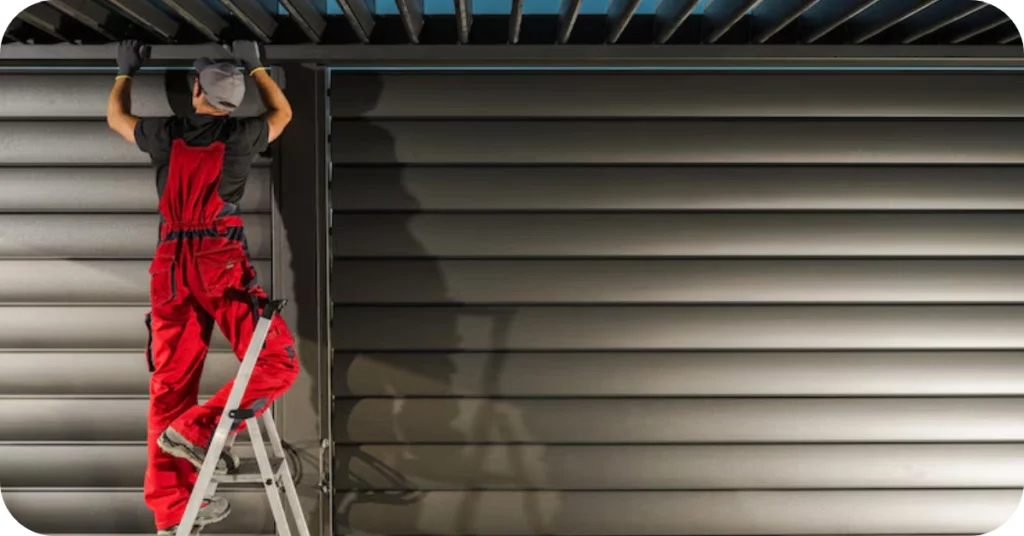Signs Your Garage Door Needs a Professional Inspection

Your garage door is more than just an entryway it’s a key part of your everyday life. Whether you’re using it multiple times a day or just occasionally for car access, it’s important to make sure it’s working properly. After all, your garage door safeguards your vehicles, personal belongings, and even the entire home. Ignoring early signs of wear or malfunction can lead to costly repairs, potential damage, or even accidents. That’s why it’s so important to pay attention to any unusual sounds or behaviors that could indicate the need for a professional inspection.
In this article, we’ll look at some common signs that your garage door might need expert attention. With a little care and regular maintenance, you can keep your garage door running smoothly and safely for years to come.
Unusual Noises When Operating the Door
A garage door should ideally open and close smoothly with little to no noise. However, if you start hearing strange or loud sounds like squeaking, grinding, or banging, it’s a clear sign that something is wrong. While occasional squeaks or rattles can be normal, persistent or unusual noises usually point to underlying issues that need attention.
Example:
imagine you’re backing your car out in the morning, and you hear a loud grinding sound as the door moves. This could mean the door’s springs are under too much tension, or the rollers have worn down. In either case, it’s best to have a professional take a look to prevent further damage.
Unusual noises can be caused by a variety of issues, such as:
Worn-out rollers or hinges: Over time, the metal rollers and hinges can wear out and may need lubrication or replacement.
Broken springs or cables: A snapping or grinding sound could mean one of the components responsible for lifting the door is malfunctioning.
Improper alignment: If the door isn’t aligned properly, it can cause friction and noise as it moves up and down.
In any of these cases, it’s important to address the issue sooner rather than later to keep your garage door functioning safely and smoothly.
Slow or Jerky Movement
If your garage door isn’t opening or closing smoothly, it’s a signal that something might be wrong. A door that moves slowly or jerks during operation could indicate problems with the springs, tracks, or the opener itself.
Example:
Let’s say your garage door normally opens smoothly, but lately, it takes much longer to go up or down, or it seems to stop and start unexpectedly. This can be a result of a malfunctioning opener or issues with the door’s tension. For example, if the springs have worn out or lost tension, the door may struggle to lift, leading to a jerky or delayed movement.
This issue can arise from:
Worn springs: Over time, the springs that help lift the door can weaken and lose their ability to support the door’s weight.
Track misalignment: If the tracks are bent or misaligned, the door can become stuck or move erratically.
Opener malfunction: If the motor is failing, it can affect the door’s smooth operation.
A professional inspection will determine the exact cause and suggest the best course of action.
Sagging or Uneven Door
A garage door that appears to be sagging, or one that opens unevenly, is a clear sign that it needs immediate attention. A properly balanced garage door should remain level both when open and closed.
Example:
Imagine one side of your garage door seems lower than the other when it’s halfway open. This can indicate that the springs are not properly balanced or one side is experiencing more tension than the other. An uneven door can place unnecessary strain on the system, leading to quicker wear and even the possibility of further damage or breakage.
Sagging and uneven doors are often caused by:
Spring imbalance: If the springs aren’t calibrated correctly, they may not be able to evenly distribute the weight of the door.
Broken cables: A snapped or frayed cable can cause the door to hang unevenly, creating an imbalance.
Track issues: If the tracks aren’t level, it can lead to the door leaning or sagging to one side.
A professional will inspect the door’s balance and make the necessary adjustments.
Increased Energy Bills
Believe it or not, your garage door can impact your home’s energy efficiency. If you notice that your heating and cooling costs are higher than usual, your garage door may not be properly sealed or insulated.
Example:
Perhaps you’ve noticed a draft coming from your garage when you’re in your home. This could mean that the weatherstripping or seals on the door have worn out, allowing cold or hot air to seep in. Not only does this affect your comfort, but it can also drive up your energy bills because your HVAC system has to work harder to compensate for the loss of air.
Signs of energy inefficiency include:
Damaged seals or weatherstripping: If these elements are cracked or missing, outside air can easily enter, affecting the temperature inside.
Poor insulation: If your garage door lacks proper insulation, it will be less efficient at keeping the temperature inside your garage consistent, causing your home’s heating and cooling system to work overtime.
A professional inspection can help identify areas where your garage door is letting air in, and they can recommend better sealing or insulation solutions.
Door Reverses Direction
A garage door that suddenly reverses direction when it’s closing is not only an inconvenience—it can also be a safety hazard. This issue could occur when the door is almost closed and suddenly moves back upward without any obvious reason.
Example:
You’re about to leave for work, and as you press the button to close the door, it starts to close, but before it fully shuts, it reverses and opens again. This could be due to:
Misaligned sensors: Modern garage doors are equipped with safety sensors that prevent the door from closing if something is in the way. If these sensors are dirty, misaligned, or malfunctioning, they may send a false signal that something is blocking the door.
Obstruction in the path: Sometimes, a small object or even debris in the track could cause the door to reverse unexpectedly.
If the door continues to reverse without a clear cause, it’s time for a professional inspection to check the sensors, tracks, and other components.
Failure to Respond to Remote or Wall Switch
When you press the remote or wall switch and the door doesn’t respond, it can be frustrating. While the problem might sometimes be something simple, like a dead battery in the remote, a complete failure to operate the door often signals a bigger issue.
Example:
You’re in a hurry to get somewhere, but when you press the button, nothing happens. After checking the remote’s battery and ensuring the opener is plugged in, the issue may lie deeper in the system—possibly with the opener itself or the electrical components.
Common causes include:
Power issues: If the opener isn’t getting power, it might need an electrical inspection.
Sensor malfunction: If the safety sensors are misaligned, they might prevent the door from functioning.
Motor failure: If the motor is faulty or burned out, the door will not operate.
A professional technician can diagnose the issue and restore functionality.
Visible Wear and Tear
If you notice any visible damage to the garage door itself, such as dents, cracks, or signs of rust, this is a clear indicator that your door needs attention. Even small issues like chipped paint or minor rust can become bigger problems if left unattended.
Example:
After years of use, the bottom section of your garage door might start to show signs of rust. While rust may seem like a cosmetic issue at first, it can weaken the door’s structural integrity and lead to more severe problems down the line, such as a door that becomes difficult to open or close.
Other visible signs of wear could include:
Frayed cables: This indicates that the cables could snap soon, leading to a malfunction.
Cracked panels: These may compromise the insulation or security of the door.
Bent tracks: This could prevent smooth movement of the door and cause it to malfunction.
A professional inspection will help assess the full extent of the damage and determine whether a repair or replacement is needed.
The Door Is Hard to Lift or Doesn’t Lift at All
If your garage door is suddenly difficult to lift or won’t lift at all, it’s a clear sign that something’s wrong with the door’s mechanics. This could be caused by a malfunction in the springs, opener, or other key components.
Example:
Imagine you try to lift your garage door manually, but it feels unusually heavy, or you can’t get it to move at all. This could be because the torsion spring has broken, the door’s track is blocked, or there’s a malfunction in the opener.
This could happen because:
Broken or worn springs: The springs are responsible for helping lift the door. When they break or lose tension, the door becomes impossible to lift.
Obstructed tracks: Dirt, debris, or even a slight bend in the tracks can prevent the door from lifting smoothly.
Opener issues: If the opener isn’t working, it can cause the door to become stuck.
A professional technician can fix these issues safely and efficiently.
Conclusion: When to Call a Professional
At TRG Technical Services, we understand that garage doors are intricate systems with numerous moving parts. Any malfunction or irregularity should be addressed promptly to prevent further damage or potential accidents. If you notice signs such as unusual noises, slow movement, visible damage, or issues with your opener, it’s important to schedule a professional inspection as soon as possible. Our trained technicians will quickly identify the underlying problem and recommend the best course of action.
Regular inspections and preventive maintenance are key to extending the lifespan of your garage door and ensuring it operates safely and efficiently. Don’t wait for problems to escalate contact TRG Technical Services today to address any issues right away and keep your garage door functioning smoothly for years to come.
Hire Garage Door Professionals in Dubai Through TRG Technical Services.


 Previous Post
Previous Post